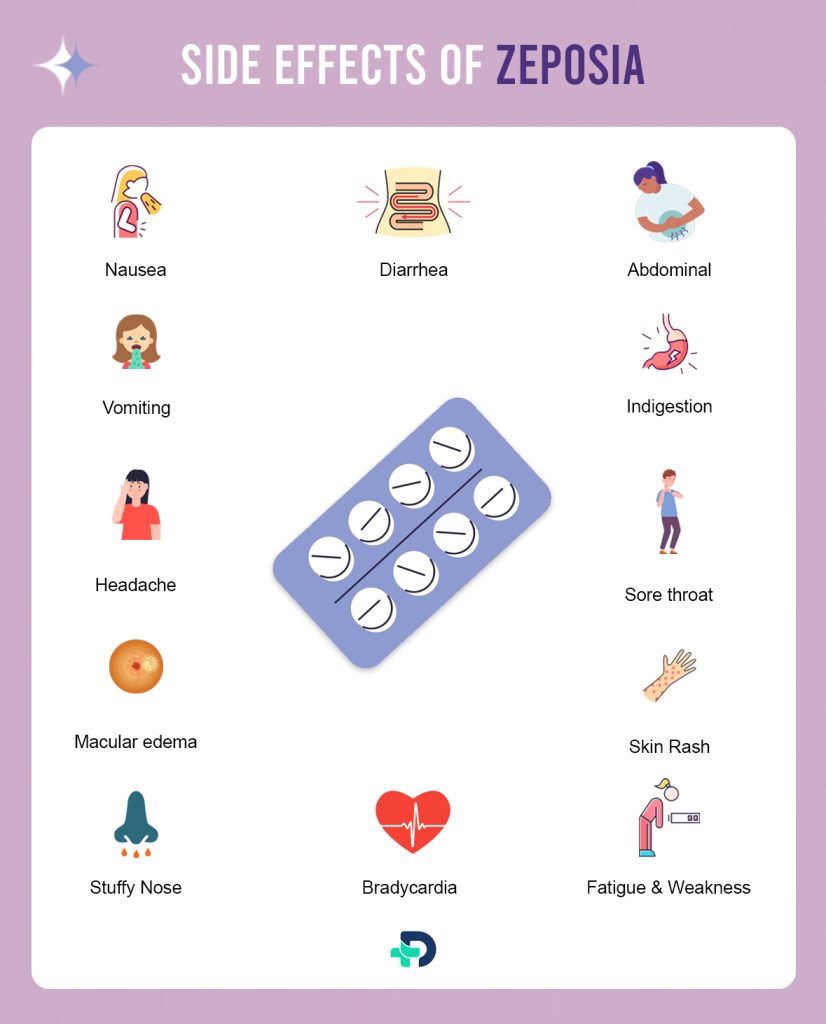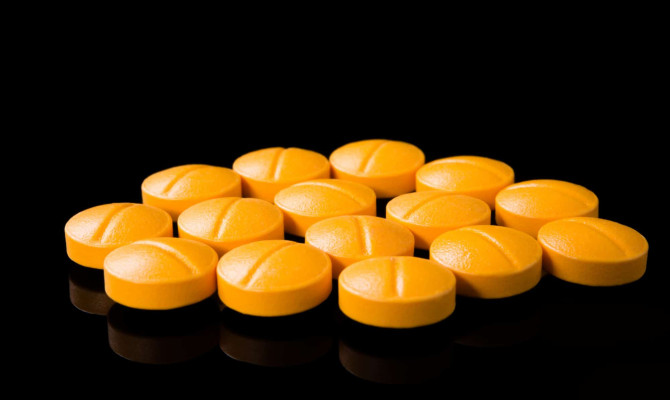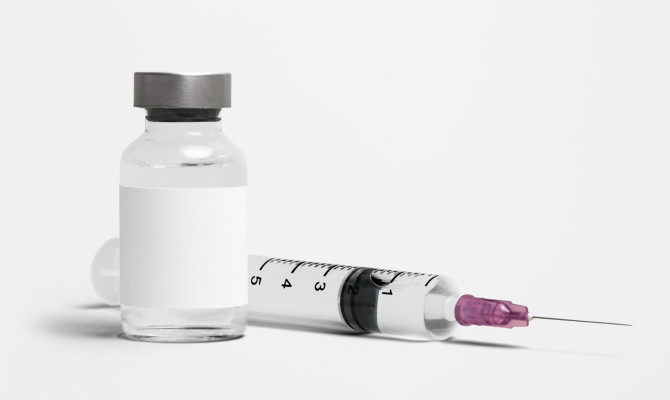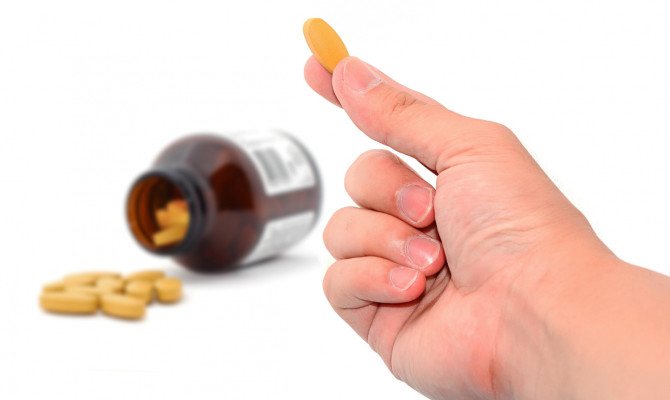Zeposia Side Effects, Uses & Safety

- Zeposia
- 10 Oct 2023
Introduction
Zeposia
Zeposia, also known by its generic name ozanimod, is a medication primarily used to treat certain autoimmune conditions, including multiple sclerosis and ulcerative colitis. It is a member of a group of medications called sphingosine phosphate receptor modulators, which work by influencing the immune system to lessen inflammation and disease activity. It has potential negative effects like all drugs, even though it can be a successful treatment for many illnesses. Understanding these and their management is essential for people prescribed Zeposia or considering it as a treatment option.

Throughout this article will deliver its typical and severe side effects and explore how to monitor and manage them. It’s important to note that this information should serve as a general guide, and individuals should always consult their healthcare provider for personalized advice and guidance.
Uses
Zeposia Uses
- Adults with relapsing forms of multiple sclerosis may use it for treatment. It helps reduce the frequency of relapses, delay disability progression, and manage symptoms associated with this neurological condition.
- Adults with moderate to severe ulcerative colitis may also be treated with it. It induces and maintains clinical remission in patients with this inflammatory bowel disease. 1 Uses | Researched based study from United States Food and Drug Administration, 2 Uses | Researched based study from National Institutes of Health
Crohn’s disease
- In some cases, it may be considered a treatment option for adults with Crohn’s disease, another inflammatory bowel disease. However, its use for this condition may vary depending on individual patient factors and Healthcare provider recommendations. 1 Uses | Researched based study from United States Food and Drug Administration
Side Effects

Zeposia Side Effects
Gastrointestinal Side Effects:
- Nausea
- Diarrhea
- Abdominal
- Pain or discomfort
- Vomiting
- Indigestion
Zeposia is known to cause gastrointestinal side effects, however they are often moderate and go better over time. However, if these symptoms become severe or persistent, it is essential to inform your doctor.
Headache & Dizziness
- Headache
- Dizziness or lightheadedness
- Vertigo
Headache and dizziness can occur as a side effects of Zeposia. if you experience severe or persistent headache or if dizziness becomes a safety concern, consult your Healthcare provider for guidance.
Respiratory Issues:
- Upper respiratory tract infections
- Cough
- Sore throat
Running or Stuffy Nose
- Respiratory issues such as upper respiratory tract infections are relatively common side effects. These are typically mild and may resolve without medical intervention.
Fatigue & Weakness
- Feeling fatigue, or weak can also be side effects of zeposia. these symptoms may affect your daily activities. It is essential to discuss persistent fatigue or weakness with your Healthcare provider as they can provide proper guidance on managing these. 1 Side Effects | Researched based study from United States Food and Drug Administration
Serious Side Effects:
Certainly here are some severe side effects associated with Zeposia:
Cardiac Effects
Bradycardia (slow heart rate)
- It can cause a significant decrease in heart rate, especially when first starting the medication. During treatment, regular heart rate monitoring is crucial.
The atrioventricular block
- This is a situation when the electrical signals between the upper and lower chambers of the heart are delayed or interrupted. Heart palpitations or irregular heart rhythms. This can occur in some cases.
- Cardiac effects can be severe and require close monitoring by a healthcare provider. Regular heart rate checks are typically performed before and during treatment.
Liver Function Changes
Elevated liver enzymes
- Increased liver enzyme levels may be a sign of inflammation or injury to the liver.
Hepatitis
- In rare cases, severe liver informal inflammation has been reported with the Zeposia use.
- Liver function should be regularly monitored while taking the drug.
- Any indications of liver issues, such as abdominal pain or jaundice (a yellowing of the skin or eyes), should be reported right away.
Virus infection risk
- Heightened vulnerability to infections. It might raise the risk of illnesses by affecting the immune system.
Leukoencephalopathy that is progressively developing (PML)
- This is a severe viral infection of the brain that is uncommon and has been linked to some drugs.
- Although the risk with zeposia appears to be low. Patients on this drug should be vigilant for signs of infections such as fever, cough, or flu like symptoms.
Zeposia Eye Side Effects
Macular edema
- The macula, an area of the eye responsible for central vision, may expand as a result. This can cause vision disturbances.
- Blurred image or other visual changes. Some people may experience changes in their sight.
- Any significant vision changes should be reported to a healthcare provider promptly. Regular eye exams are recommended during the treatment.
Allergic Reactions
Skin Rash
- After using this medication, some patients may experience a skin rash.
(Urticaria) Hives
- Raised, itchy bumps on the skin that frequently have edema and redness.
Swelling and breathing issues
- It is possible for the cheeks, lips, tongue, or neck to swell. If it affects the airway, this may be especially problematic.
- Shortness of breath or wheezing can occur during severe allergic reactions. 1 Side Effects | Researched based study from United States Food and Drug Administration
Interactions
Drug Interactions with Zeposia
Vaccinations
- The immune system may be suppressed, which could lessen the efficiency of immunizations. Before beginning this medication, it is crucial to go over immunization options and schedules with your healthcare physician.
Strong CYP2C8 inhibitors
- Some medications that inhibit the CYP2C8 enzyme can increase the levels of zeposia in the body. Your healthcare provider will consider this when prescribing Other Drugs.
Strong CYP2C8 inducers
- Zeposia may be less effective if used in conjunction with potent CYP2C8 inducers like rifampin because it limits exposure to ozanimod’s major metabolites. Hence the, co-administration is not recommended.
Monoamine oxidase inhibitors
- It may slow the administration of zeposia with MOA inhibitors and reduce exposure to the active metabolites of ozanimod. Ozanimod’s metabolites may also inhibit MAO.
- Although the possibility of a clinical interaction has not been researched, the elevated risk could result in a hypertensive crisis. Therefore, co-administration of these two is not recommended. 1 Drug Interactions | Researched based study from United States Food and Drug Administration
Precautions
Warnings & Precautions for Zeposia
Infections
- It may increase the susceptibility to infections; some can also be serious and fatal in nature. Before starting treatment, discuss your vaccination status with your healthcare provider and ensure you are up to date on necessary vaccinations especially those for preventable diseases like influence and pneumococcal pneumonia.
Cardiac effects
- It can cause a significant decrease in heart rate, especially when you first start taking it. Your healthcare provider may perform an electrocardiogram treatment to monitor your heart rate. If you have a history of heart problems or take medications that affect heart rate inform your healthcare provider.
Liver function
- It can lead to elevated liver enzymes and, in rare cases, severe liver problems. Regular monitoring of liver function is essential. If you have a history of liver illness or are taking medications that damage the liver, let your doctor know.
Pregnancy and fertility
- Both male and female fertility may be impacted by it. Before beginning treatment, it is imperative to discuss family planning with your healthcare physician. may potentially provide dangers during pregnancy, so be sure to tell your doctor if you’re expecting or intend to get pregnant.
Breastfeeding
- The drug may pass into breast milk, and its effects on a person in front are not well known. 1 Precautions | Researched based study from United States Food and Drug Administration
Management
Monitoring Side Effects of Zeposia & Management
Regular Checkups
Medical monitoring
- Your healthcare provider will schedule regular checkups to monitor your progress and assess your response to the treatment.
- These checkups may include blood tests to evaluate liver function and heart rate monitoring. If a significant decrease in heart rate or business or fainting is to contact your healthcare provider immediately.
Managing side effects
Communication
- Whenever you have any adverse effects, keep an open line of communication with your healthcare professional.
Gastrointestinal Side effects
- If you experience nausea, diarrhea, abdominal discomfort, and dietary changes over the counter medications or adjusting the dosage may be recommended.
Fatigue and weakness
- If you feel tired or weak, make sure you get adequate rest and consider adjusting your daily activities as needed. 1 Monitoring and Management | Researched based study from United States Food and Drug Administration
FAQs
FAQs About Zeposia
Q. Is Zeposia a high-risk medication?
- It is not considered a high-risk medication in the sense that it is not typically associated with an exceptionally high risk of severe Side Effects or complications for all people.
- However, like many medications, it does come with certain risks and consideration carefully evaluated and monitored.
Q. Does Zeposia cause weight gain?
- Weight gain is not a side effect of this medication that is typically documented.
- However, like many medications, individual responses can vary, and some people may experience changes in their weight while taking it.
Q. What foods to avoid when taking Zeposia?
- Alcohol consumption should be moderate as it may interact with alcohol and cause adverse effects. It is advisable to Limit or avoid grapefruit and grapefruit juice when taking this medication in general, as grapefruit can interact with certain drugs, potentially affecting their absorption.
Q. How long do Zeposia Side Effects last?
- The time frame can differ from person to person. Some Side Effects may be temporary and resolve independently as your body adjusts to the medication, while others may persist for longer.
Any feedback on this article?
 This Articles content was accurate
This Articles content was accurate Very Informative Article
Very Informative Article I have a question or a comment
I have a question or a comment
 This article contains inaccurate content
This article contains inaccurate content This article was not helpful
This article was not helpful I have a question or a comment
I have a question or a comment
We appreciate your helpful feedback!
Checkout our social pages
References
-
United States Food and Drug Administration
Uses | Side Effects | Drug Interactions | Precautions | Monitoring and Management
-
National Institutes of Health
Uses




































